- There are no more items in your cart
- Shipping Calculated at checkout
-
Sub-Total (inc. VAT)
£0.00
Need Help?
Asphalt, Road and Tarmac Repairs
Asphalt, road, and tarmac repair products are essential for the upkeep of heavily trafficked surfaces, ensuring longevity and safety. These specialist products cater to various repair needs, from minor asphalt crack repair to extensive road repairs. Ideal for urban roads, highways, car parks, driveways, and airport runways, these products include asphalt repair compounds, liquid tarmac fillers, and bituminous road repair materials. Designed to withstand the stress of daily use, these solutions are crucial for maintaining road safety and integrity. For specific product recommendations and compatibility, contact the technical team at Rawlins Paints. Click here for more info.
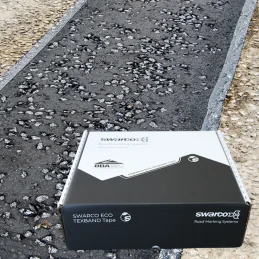
Swarco Hitex Eco Texband Tape
A preformed system for the permanent repair of open seams, joints or cracks. Used as a simple overband, it will repair defects up to 5mm wide. Ideal for sealing the surface following asphalt patching such as utility works. Previously known as Hitex TexBand BBA/HAPAS Approved Overbanding Tape Simple torch on application provides a simple...
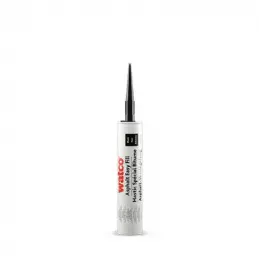
Watco Asphalt Easy Fill
A flexible rubberised filler that seals cracks in asphalt, concrete, metal, stone, and brick, helping protect against damage caused by water ingress and erosion. Dries in 24 hours Fits a standard skeleton gun for quick clean repairs Remains flexible for years, moves with substrate (+/-5%) Note: While great care is taken with the...
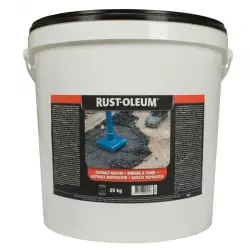
Rust-Oleum 5410 Asphalt Repair
Black bitumen-based patch repair for durable, immediate pothole fixes. For use on asphalt and concrete surfaces including roads, car parks, and paths. Withstands heavy traffic immediately after application. No mix required.
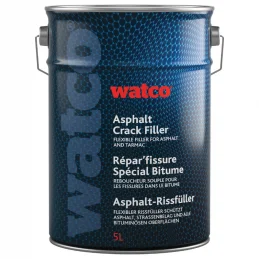
Watco Asphalt Crack Filler
A rubberised bitumen-based product that makes crack repairs on asphalt and tarmac easy, simply pouring into cracks up to 3mm from a spouted can. Ideal for use in car parks and on walkways, school playgrounds, and more. Quick to dry - approx. 2-4 hours for cracks up to 3mm Interior and exterior use Flexible to allow for expansion and...
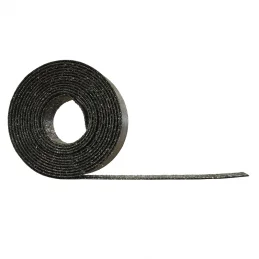
Swarco Hitex Non-BBA Overbanding Tape
A preformed overband tape system for the permanent repair of open seams, joints or cracks. Used as a simple overband, it will repair defects up to 5mm wide. Overbanding tape is a long lasting, rapid solution for sealing surfaces following road repairs and utility works. Simple torch on application provides an overband seal No need for...
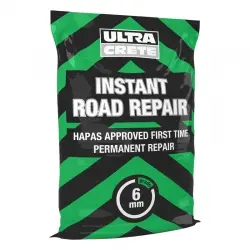
Instarmac UltraCrete Instant Road Repair 6mm
UltraCrete Instant Road Repair 6mm grade is designed for permanent asphalt repairs in footways, footpaths and cycle tracks. Easy work formula Easier to compact HAPAS Approved since 2002 Instantly trafficable No waste, resealable buckets Easy to apply For planned and reactive repairs Use in all weathers More Information Delivery...
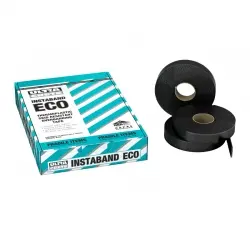
Instarmac UltraCrete Instaband Eco Thermoplastic Overbanding Tape
Designed for the application to asphalt roads to prevent water ingress and progressive fretting. HAPAS Approved since 2012 No waste, cut as required Prolongs the life of your repair Easy to use Fast installation Open to traffic: 10 minutes Box of 12 rolls Please note: This product is subject to a minimum order quantity of 4 x boxes...
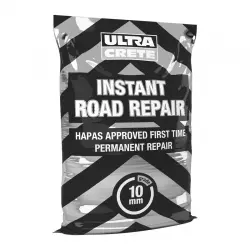
Instarmac UltraCrete Instant Road Repair 10mm
10mm grade - For permanent repairs in type 3 & 4 roads Easy work formula Easier to compact HAPAS Approved since 2002 Instantly trafficable No waste, resealable buckets Easy to apply Depth: 30-100mm Use in all weathers For planned repairs More Information Delivery Info
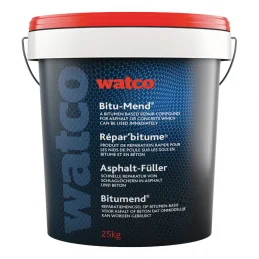
Watco Bitu-Mend Pothole Repair
An easy-to-use material for repairing pot-holes. For use on exterior potholed asphalt and concrete, ideal for potholes in roadways, vehicle parks, loading docks, paths, airfields etc, and on bituminous and concrete surfaces. Unique aggregate mix Use straight from the tub - primer included Less prone to crumbling High concentrate of...
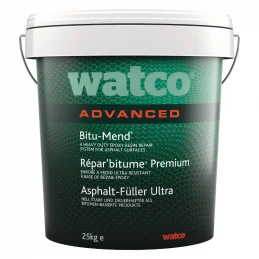
Watco Bitu-Mend Advanced
For the strongest ever asphalt repairs in car parks and loading bays where forklifts and lorries operate. Cures to a hard, black, slip resistant finish that is ready for use in 12 hours. Can be applied at any thickness from 10mm -100mm Can also be used on concrete Ideal for use on splits and cracks in asphalt, roller shutter door guide...
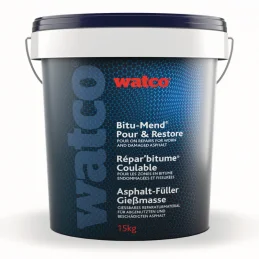
Watco Bitu-Mend Pour And Restore
Pour on shallow surface repairs to damaged or cracked asphalt and tarmac such as shallow depressions, dished or pitted asphalt surfaces in car parks, yards, and pavements. Use between 6-20mm deep Self-smoothing epoxy formula Slip resistant surface Easy to mix and apply Good general resistance to many common chemicals such as diesel,...
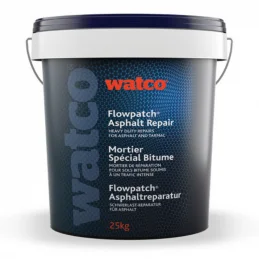
Watco Flowpatch Asphalt Floor Repair
Fast, pourable and strong, heavy-duty repairs for asphalt and tarmac. Ideal for car parks, loading areas, drives and paths, internal asphalt floors, etc. Tough, fibre reinforced repairs for heavy wear areas For concrete see Watco Flowpatch Quick Setting Pourable Repair Mortar Just add water, mix & pour Can be applied to damp (not...
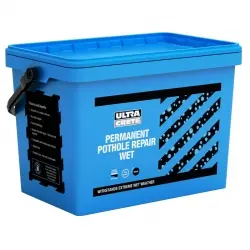
Instarmac UltraCrete Permanent Pothole Repair Wet
Ideal for the repair of potholes in roads, driveways and car parks. Easy work formula Easier to compact Made for use in the wet Instantly trafficable No waste, resealable buckets Easy to apply For planned and reactive repairs Withstands hydraulic stress More Information Delivery Info
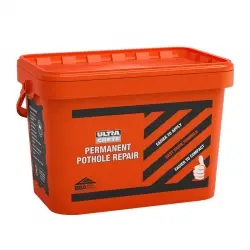
Instarmac UltraCrete Permanent Pothole Repair
Permanent Pothole Repair is ideal for the repair of potholes in roads, driveways and car parks. It gained HAPAS approval in 2011 and is instantly trafficable causing minimal disruption to pedestrians Easy work formula Easier to compact HAPAS Approved since 2011 Instantly trafficable No waste, resealable buckets Easy to apply Depth:...
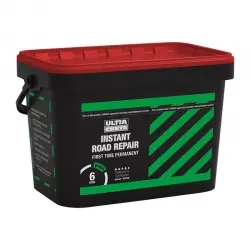
Instarmac UltraCrete Instant Road Repair Red
6mm grade - For permanent repairs to cushions and ramps, bus lanes, cycle tracks, bus stops and colour coded car parking. Easy work formula Easier to compact HAPAS Approved since 2002 Instantly trafficable No waste, resealable buckets Depth: 15-100mm Easy to apply For planned and reactive repairs Use in all weathers Please note:...
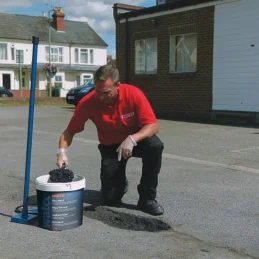
Watco Bitu-Mend Application Kit
Everything you need for easy application of Watco Bitu-Mend. High quality and durable tools Paint brush for an easy primer application Hand shovel to apply Watco Bitu-Mend easily Tamper for optimum compaction Wallet and gloves to protect your hands More Information Delivery Info
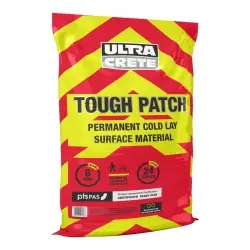
Instarmac UltraCrete Tough Patch 6mm
An instant solution for utility apparatus installations and reinstatements, permanent repairs and patching in footpaths, and temporary pothole repairs in carriageways. Certified for use through the Product Assessment Scheme (PAS) First time permanent, emergency and temporary repairs Rapid curing, instantly trafficable High deformation...
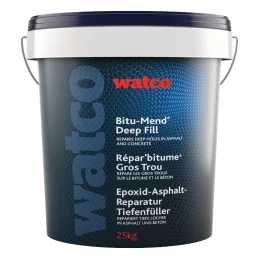
Watco Bitu-Mend Deep Fill
For filling deep holes in asphalt and concrete, up to 200mm in one application, in heavily trafficked areas like car parks or loading bays. Three-component A blend of graded granite aggregate and epoxy resin No primer required Easy to apply with a tamper Hardwearing epoxy formula Suitable for forklift and heavy traffic areas Good...
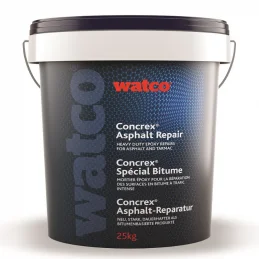
Watco Concrex Asphalt Repair
A heavy duty epoxy resin repair system for ultra-strong repairs to damaged concrete and asphalt. Repair trip hazards and potholes, gangways and work areas Car parks and loading bays, bed in and fix roller shutter door guide rails, etc Takes heavy traffic Ideal for shallow repairs asphalt and tarmac Strong enough to hold guide posts and...
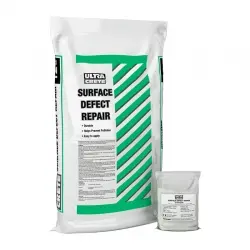
Instarmac UltraCrete Surface Defect Repair
A surface defect repair system developed to address specific areas of preventative maintenance. Helps prevent potholes forming Durable Easy to use No waste Please note: This product is subject to a minimum order quantity of 9 x 13KG packs More Information Delivery Info
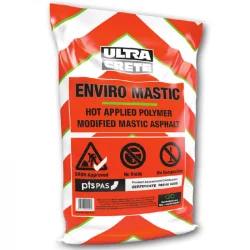
Instarmac UltraCrete Enviro Mastic
Instarmac UltraCrete Enviro Mastic, a hot applied polymer modified mastic asphalt that gives superior performance in the patching and repairing of carriageways, footpaths, footways and cycle tracks or as a surface finish when installing street furniture and access covers. Please note, this product is only available with a minimum order of...
Need Help?
Need Help?
Asphalt, tarmac, and road surfaces are integral to modern infrastructure, providing durable surfaces that are needed for a variety of applications. These surfaces are found everywhere - from residential driveways to expansive highways - and are subject to constant wear and tear from traffic, weather, and environmental factors. The importance of regular asphalt repair cannot be overstated, as neglecting these surfaces can lead to hazardous conditions, increased repair costs, and significant disruptions.
Specialist asphalt repair products are designed to address the specific challenges that these surfaces face. From asphalt pothole repair to extensive road repair, these products offer solutions that ensure the longevity and safety of any asphalt or tarmac surface. Understanding where and why asphalt repairs are necessary, and choosing the right road repair materials, is crucial for maintaining these essential surfaces.
Where Are Asphalt and Tarmac Used?
Asphalt and tarmac are widely used in numerous settings due to their durability, flexibility, and cost-effectiveness. Some of the most common areas where these materials are applied includes:
Urban Roads
Urban roads form the essential arteries of cities, facilitating the daily movement of millions of vehicles. These roads are predominantly surfaced with asphalt, valued for its smoothness, durability, and cost-effectiveness. The constant flow of traffic, including cars, buses, lorries, and emergency vehicles, subjects urban roads to significant wear and tear. This relentless use, combined with environmental factors like rain, snow, and extreme temperatures, necessitates frequent asphalt surface repair.
Urban roads must be maintained to ensure safety and efficiency, as any deterioration can lead to traffic congestion, increased vehicular accidents, and higher vehicle operating costs due to damage from road imperfections. Asphalt is preferred in these environments because it can be quickly repaired using liquid tarmac repair products, which allows for rapid patching of potholes, cracks, and other surface defects. This is crucial in densely populated areas where road closures or prolonged repair work can cause significant disruption to daily life. Moreover, the versatility of asphalt makes it suitable for various repair techniques, from simple tarmac filler applications for small cracks to more extensive asphalt pothole repair for larger issues. Regular maintenance using specialised asphalt repair products is essential to prolong the lifespan of urban roads, ensuring they remain safe and functional amidst heavy and continuous usage.
High-Speed Roads and Motorways
High-speed roads and motorways are critical components of national transportation networks, designed to facilitate the rapid movement of goods and passengers across long distances. These roads are built to handle high-speed traffic, with vehicles often travelling at speeds up to 70 mph. The immense pressure exerted by constant, high-speed traffic requires surfaces that can endure significant stress, making asphalt the material of choice for these critical routes.
The demands on these surfaces are immense, with heavy lorries, buses, and cars placing constant strain on the asphalt. Over time, this can lead to the formation of cracks, ruts, and potholes, all of which pose serious safety hazards if not addressed promptly. Asphalt road repair is essential for maintaining the integrity of these routes. The use of bituminous road repair materials is common, as these are specifically designed to withstand the extreme conditions present on motorways. These materials offer a robust solution for road crack repair, ensuring that the surface remains smooth and free of defects that could cause accidents or damage to vehicles. Regular maintenance, including the use of hot tar road repair techniques, helps to extend the life of the surface, reducing the need for more extensive and costly repairs in the future.
Car Parks
Car parks, whether attached to shopping centres, office complexes, or residential buildings, are typically surfaced with asphalt due to its durability and ease of maintenance. These environments are subject to constant vehicle movement, with cars entering, parking, and exiting throughout the day. The high frequency of traffic, combined with the weight of stationary vehicles, can cause surface damage over time, leading to cracks, depressions, and even potholes. This damage can also displace demarcation lines and symbols, making it harder to enforce traffic management.
The demand for asphalt floor repair in car parks is therefore high, as maintaining a smooth, level surface is essential for safety and convenience. Minor damages can be quickly addressed using tarmac filler, which is ideal for filling small cracks and preventing water infiltration that could lead to further deterioration. For more extensive damage, such as potholes or large cracks, tarmac patch repair products are commonly employed. These repairs not only enhance the visual appeal of the car park but also prevent potential hazards that could cause accidents or damage vehicles. Regular inspections and timely repairs using asphalt repair products are crucial to ensuring that car parks remain safe, functional, and visually appealing.
Driveways
Driveways, whether residential or commercial, are often surfaced with tarmac or asphalt due to their durability, cost-effectiveness, and ease of installation. Over time, however, even the most well-constructed driveways are subject to wear and tear from daily vehicle use, exposure to the elements, and the natural ageing process of the materials. Cracks, fading, and the formation of small potholes are common issues that can detract from the driveway's appearance and functionality. Whilst these defects can often be painted over on a driveway, they will eventually require repair.
Tarmac repair is essential for maintaining the integrity of driveways, particularly in residential settings where curb appeal is important. Homeowners and landlords often turn to asphalt repair products to address these issues, using tarmac filler for small cracks and liquid tarmac repair solutions for more extensive damage. Red asphalt repair may be necessary for coloured driveways that have faded due to UV exposure or chemical spills. Regular maintenance, including tarmac pothole repair, not only extends the life of the driveway but also ensures it remains a safe and attractive feature of the property.
Airport Runways and Taxiways
Airport runways and taxiways are among the most demanding environments for asphalt surfaces, requiring a material that can withstand the immense stresses imposed by heavy aircraft, extreme weather conditions, and continuous use. The weight of landing aircraft, combined with the high friction generated during takeoffs and landings, places significant strain on these surfaces, leading to wear and tear that must be addressed promptly to maintain safety standards.
Asphalt road surface repairing in airports is a critical aspect of airport maintenance, as any surface deterioration can compromise the safety of aircraft operations. Bituminous repairing materials are commonly used for these repairs, as they offer the strength and flexibility needed to handle the extreme loads and stresses typical in these environments. The ability to perform asphalt road repair quickly and efficiently is crucial in airports, where any delay can disrupt schedules and lead to significant financial losses. Regular inspections and timely repairs ensure that runways and taxiways remain in optimal condition, preventing accidents and maintaining the operational efficiency of the airport.
Industrial Estates
Industrial estates are high-traffic environments where heavy machinery, delivery trucks, and other large vehicles are constantly in motion. The weight and frequency of this traffic, combined with potential chemical spills and harsh environmental conditions, can cause significant damage to asphalt surfaces over time. Common issues in these areas include cracks, ruts, and potholes, all of which can impede operations and pose safety risks.
Asphalt repairs in industrial estates are essential to maintain operational efficiency and prevent accidents. Products like concrete pothole repair and hot tar road repair are frequently used to address the severe wear that occurs in these settings. These materials are designed to handle the heavy loads and harsh conditions typical of industrial environments, ensuring that repairs are durable and long-lasting. Regular maintenance using asphalt repair products helps to minimise downtime and prevent more extensive damage, ensuring that the estate remains functional and safe for all users.
Footpaths and Cycleways
Footpaths and cycleways are vital components of urban infrastructure, providing safe and accessible routes for pedestrians and cyclists. These surfaces are typically made of asphalt, which offers a smooth, even surface that enhances comfort and safety. However, despite the lighter loads compared to roads, footpaths and cycleways are still subject to wear and tear from foot traffic, bicycles, and environmental factors such as rain, ice, and UV exposure.
Asphalt surface repair is essential for maintaining the usability and safety of footpaths and cycleways. Small cracks, if left untreated, can expand and create hazards for pedestrians and cyclists, particularly in wet or icy conditions. Road crack repair products are ideal for quickly addressing these issues, preventing further deterioration and ensuring that the paths remain smooth and safe. Regular inspections and timely repairs using asphalt repair products are crucial to maintaining the integrity of these surfaces, promoting safety and accessibility in urban areas.
Playgrounds and Sports Courts
In recreational areas such as playgrounds and sports courts, asphalt is often used to create durable, low-maintenance surfaces that can withstand heavy foot traffic and regular use. These environments, which may include basketball courts, tennis courts, and playgrounds, require surfaces that are not only durable but also safe for users. Over time, however, these surfaces can develop cracks, wear spots, and other forms of damage due to constant use and exposure to the elements.
Asphalt floor repair is frequently needed in these settings to maintain the safety and functionality of the surfaces. Tarmac filler is often used to address minor cracks and prevent them from expanding, while more extensive damage may require the use of other road repair materials. The key to maintaining playgrounds and sports courts is regular maintenance and prompt repairs, which ensure that these recreational areas remain safe and enjoyable for all users. In addition to safety, well-maintained surfaces also enhance the aesthetic appeal of these public spaces, encouraging more community engagement and physical activity.
Bridges and Overpasses
Bridges and overpasses present unique challenges for asphalt surfaces due to the dynamic nature of these structures. These surfaces are subjected to constant vibrations, temperature fluctuations, and the weight of vehicles, all of which can lead to the development of cracks, potholes, and other forms of damage. Additionally, the exposure to the elements, including rain, snow, and UV rays, further contributes to the wear and tear of asphalt on these structures.
Asphalt road repair on bridges and overpasses is critical to ensuring the safety and longevity of these structures. Specialised highway maintenance products are often used to address the specific needs of these surfaces, providing the necessary flexibility and durability to withstand the unique stresses encountered on bridges and overpasses. Regular inspections and timely repairs are essential to prevent small issues from developing into major structural problems, ensuring that these critical components of transportation infrastructure remain safe and functional for all users.
Loading Bays and Service Areas
Loading bays and service areas in commercial environments are high-stress zones where heavy vehicles frequently load and unload goods. The constant pressure exerted by these activities, combined with potential spills of oil, fuel, and other chemicals, can lead to significant wear and tear on asphalt surfaces. Over time, this can result in the formation of cracks, potholes, and other forms of damage that can impede operations and create safety hazards.
Asphalt pothole repair and concrete road repair products are essential for maintaining the functionality of loading bays and service areas. These products are designed to withstand the heavy loads and harsh conditions typical of these environments, providing durable repairs that can handle the demands of daily operations. Regular maintenance using asphalt repair products helps to ensure that these critical areas remain safe and operational, minimising downtime and preventing costly disruptions to business activities.
Bus Stops and Laybys
Bus stops and laybys are high-traffic areas where vehicles frequently stop, start, and idle, placing significant stress on the asphalt surfaces. The constant movement of heavy buses, combined with the impact of braking and acceleration, can lead to the rapid development of cracks, potholes, and other forms of surface damage. If not addressed promptly, these issues can create hazards for both vehicles and pedestrians.
Frequent tarmac repair is necessary in these areas to maintain smooth and safe surfaces. Asphalt repairs, including the use of bituminous repairing materials, are essential to reinforce these surfaces and prevent the development of more serious issues. Regular inspections and timely repairs help to ensure that bus stops and laybys remain safe and accessible for all users, reducing the risk of accidents and improving the overall efficiency of public transportation.
Railway Platforms
Railway platforms are critical points of access in transportation networks, requiring durable surfaces that can handle heavy pedestrian traffic and the weight of trains. Asphalt is commonly used on these platforms due to its strength and durability. However, the constant exposure to the elements, combined with the vibrations and movements generated by passing trains, can lead to the development of cracks, potholes, and other forms of damage.
Regular asphalt road surface repairing is necessary to address any damage that could pose a risk to safety. The use of specialised asphalt repair products ensures that the surface remains smooth and durable, capable of withstanding the demands of both pedestrian traffic and train operations. Regular maintenance is essential to prevent small issues from escalating into major safety hazards, ensuring that railway platforms remain safe and functional for all users.
This is not an exhaustive list and many more examples of asphalt and tarmac use exist. If you require help identifying which repairs you may need to fix a cracked or damaged surface, contact Rawlin’s Technical team. These repair experts can advise on suitable products for your project, as well as the correct preparation and application techniques.
Common Repairs Needed on Asphalt and Tarmac Surfaces
Asphalt and tarmac surfaces are durable, but over time, they inevitably require repairs to maintain their functionality and appearance. Some of the most common issues that arise may include:
Potholes
Potholes are a prevalent problem on asphalt surfaces, particularly on roads and car parks. They form when water infiltrates small cracks in the surface, weakening the base layers. As vehicles drive over these weakened areas, the asphalt collapses, creating a hole. Asphalt pothole repair is essential to fix these cavities, which can cause significant vehicle damage and safety hazards.
Cracks
Cracks in asphalt can develop for various reasons, including thermal expansion and contraction, heavy traffic loads, and natural ageing. If left untreated, small cracks can widen and deepen, eventually leading to more severe damage. Road crack repair is crucial to prevent water from penetrating the asphalt, which can accelerate the deterioration process.
Rutting
Rutting is a form of surface deformation where depressions develop in the wheel paths on the road. This issue is common on heavily trafficked roads, especially where the asphalt has not been adequately compacted. Asphalt surface repair is necessary to address these depressions, which can lead to poor drainage and hydroplaning risks.
Ravelling
Ravelling occurs when the aggregate within the asphalt surface starts to separate from the binder. This results in a rough, uneven surface that reduces traction and can make the road dangerous for vehicles. Asphalt repairs, including the application of bituminous repairing materials, are often required to restore the surface.
Edge Deterioration
The edges of asphalt surfaces are particularly vulnerable to damage, especially in rural roads and driveways where the support is minimal. Vehicles driving close to or over the edges can cause the asphalt to crack and crumble. Tarmac patch repair is a common solution to reinforce these areas and prevent further deterioration.
Patching Failures
Previous asphalt repair attempts, such as patching, can fail if not done correctly. Poor-quality patching materials or inadequate preparation can lead to the patch breaking down, allowing water to infiltrate and causing the damage to reoccur. Effective asphalt repair products are crucial for ensuring long-lasting repairs.
Surface Wear
Over time, the surface of asphalt can become worn, leading to a rough, uneven texture. This wear can result from constant vehicle traffic and exposure to the elements. Asphalt floor repair products can help restore the surface's smoothness, improving the ride quality and extending the surface's life.
Sinkholes
Sinkholes under asphalt surfaces are less common but can be extremely disruptive and dangerous. They usually occur due to subsurface issues, such as poor compaction or the collapse of underground infrastructure. Bitumen road repair products may be needed to address these serious issues and restore the integrity of the surface.
Discolouration and Fading
Exposure to UV rays and weather conditions can cause the asphalt surface to fade and lose its original colour. Red asphalt repair is often necessary in areas with coloured surfaces, such as bus lanes or cycle paths, to maintain the visual consistency and functionality of the surface.
Heaving and Buckling
In regions with significant temperature fluctuations, asphalt surfaces can heave and buckle due to freeze-thaw cycles. Water that infiltrates the surface freezes and expands, causing the asphalt to push upward. Road repair materials, including hot tar road repair products, are essential for fixing these issues and preventing further damage.
How These Issues Occur
The occurrence of problems with tarmac and asphalt can be attributed to a variety of factors, each contributing to deterioration of the surface over time. Understanding these factors is key to preventing and addressing issues effectively with specialist repair products.
Weather Conditions
Weather is one of the most significant factors affecting asphalt surfaces. Rain, snow, ice, and temperature fluctuations all play a role in the degradation process. Water is particularly damaging, as it can seep into cracks and joints, leading to freeze-thaw cycles that expand and contract the asphalt. In cold climates, this can cause heaving and cracking, while in warmer climates, prolonged exposure to heat can soften the asphalt and lead to rutting and deformation.
Traffic Load
The weight and frequency of traffic passing over asphalt surfaces are critical factors in their longevity. Heavy vehicles, such as lorries, buses, and construction equipment, exert significant pressure on the asphalt, which can lead to rutting, cracking, and eventual failure. Roads that experience high volumes of traffic are more likely to develop these issues, particularly if the asphalt was not designed to handle such loads.
Poor Installation
The quality of the initial installation of asphalt plays a crucial role in its durability. Improper compaction, inadequate thickness, or the use of substandard materials can all lead to premature failure. For example, if the asphalt is not compacted correctly, voids can form within the material, making it more susceptible to cracking and water infiltration. Similarly, if the base layers are not properly prepared, the entire surface can become unstable.
Ageing
Asphalt surfaces naturally age over time, and as they do, the binder that holds the aggregate together begins to oxidise and lose its flexibility. This process makes the asphalt more brittle and prone to cracking. While some level of ageing is inevitable, regular maintenance and timely asphalt repairs can extend the lifespan of the surface.
Subsurface Issues
Problems beneath the asphalt, such as weak subgrades, poor drainage, or shifting soil, can lead to surface damage. If the foundation is not stable, it can cause the asphalt to settle unevenly, leading to cracks, sinkholes, and other forms of deterioration. Subsurface issues are often the result of poor site preparation or natural geological changes over time.
Chemical Spills
Spills of chemicals, such as oils, fuels, and industrial solvents, can degrade the asphalt binder, weakening the surface and making it more susceptible to cracking and ravelling. These chemicals can penetrate the asphalt and break down the bonds between the aggregate and the binder, leading to rapid deterioration if not promptly addressed.
UV Exposure
Prolonged exposure to the sun's ultraviolet rays can cause the asphalt binder to oxidise and become brittle. This process, known as photo-oxidation, weakens the surface and makes it more prone to cracking and other forms of damage. UV exposure also contributes to the fading and discolouration of the asphalt, which can affect the overall appearance of the surface.
Tree Roots
Tree roots can be a significant problem for asphalt surfaces, particularly in residential areas where trees are planted close to driveways and sidewalks. As roots grow, they can exert pressure on the asphalt, causing it to lift and crack. Over time, this can lead to significant surface damage that requires extensive repairs.
Improper Drainage
Water is one of the most destructive elements for asphalt surfaces. If the drainage system is inadequate, water can pool on the surface or infiltrate the asphalt through cracks and joints. This water can then freeze and expand, causing the asphalt to crack and heave. Proper drainage is essential to prevent these issues and extend the life of the surface.
Heavy Machinery
The use of heavy machinery, particularly in industrial settings or during construction activities, can cause significant damage to asphalt surfaces. These machines exert extreme pressure on the surface, leading to cracking, rutting, and even complete failure in some cases. If the asphalt was not designed to handle such loads, or if it is already weakened, the damage can be severe and costly to repair.
FAQ’s
- What is the difference between asphalt and tarmac?
- Asphalt and tarmac are often used interchangeably, but they are technically different materials. Asphalt is a mixture of aggregates (such as sand, gravel, and crushed stone) and bitumen, a sticky, black petroleum byproduct. Tarmac, short for tarmacadam, is a type of road surface made by coating crushed stone with tar. While both materials are used for paving roads and other surfaces, asphalt is more commonly used today due to its superior durability and performance.
- How long does it take for asphalt repairs to cure?
- The curing time for asphalt repairs can vary depending on the type of repair, weather conditions, and the specific product used. In general, small crack and pothole repairs may take 24 to 48 hours to cure sufficiently for light traffic. However, full-depth repairs or larger patches may require several days to cure completely. It is advisable to follow the manufacturer's recommendations for curing times to ensure the repair lasts as long as possible.
- Can asphalt be laid in cold weather?
- Asphalt can be laid in cold weather, but it requires special consideration. Cold weather can make it more difficult to achieve proper compaction, which is essential for the longevity of the asphalt surface. To combat this, hot mix asphalt can be used, or cold lay products specifically designed for low temperatures. However, laying asphalt in extremely cold conditions is not recommended unless absolutely necessary, as it can compromise the quality of the surface.
- How often should asphalt surfaces be sealed?
- Asphalt surfaces should be sealed every two to three years to protect them from the elements and extend their lifespan. Sealing helps to prevent water infiltration, UV damage, and the effects of chemicals like oil and fuel. Regular sealing also keeps the asphalt looking fresh and new. However, over-sealing can lead to issues such as cracking, so it is important to follow a maintenance schedule that is appropriate for the specific conditions of the surface.
- What should be done if tree roots are damaging the asphalt?
- If tree roots are causing damage to an asphalt surface, it is important to address the issue as soon as possible to prevent further damage. The roots may need to be trimmed or removed, but this should be done carefully to avoid harming the tree. In some cases, a root barrier can be installed to prevent the roots from growing under the asphalt in the future. After addressing the root issue, the damaged asphalt should be repaired to restore the surface.
- Is it possible to repair asphalt during rainy weather?
- While it is possible to repair asphalt during light rain, it is not ideal. Moisture can prevent the repair materials from bonding properly with the existing asphalt, leading to a weaker repair that may not last as long. If repairs must be done in wet conditions, cold lay products designed for use in such weather should be used, and the area should be as dry as possible before starting the repair.
- What are the signs that an asphalt surface needs to be replaced rather than repaired?
- There are several signs that indicate an asphalt surface may need to be replaced rather than repaired. These include extensive cracking (also known as alligator cracking), severe rutting, widespread potholes, significant drainage issues, and the overall age of the surface. If more than 25-30% of the surface area is damaged, it is often more cost-effective to replace the asphalt rather than attempt continuous repairs.
- Can concrete surfaces be repaired with asphalt products?
- While it is possible to use asphalt products to repair minor damage on concrete surfaces, it is generally not recommended for larger repairs. Asphalt and concrete have different properties, and using asphalt on concrete may lead to poor adhesion and further damage. For best results, concrete-specific repair products should be used to address any issues on concrete surfaces.
- Why does asphalt become slippery when wet?
- Asphalt can become slippery when wet due to a combination of factors, including the type of aggregate used, the smoothness of the surface, and the presence of oils or other contaminants. Over time, the asphalt binder can wear away, exposing more of the aggregate, which can reduce traction. Regular maintenance, including the application of anti-skid treatments, can help to reduce slipperiness and improve safety.
- What is the impact of heavy traffic on asphalt surfaces?
- Heavy traffic can significantly impact asphalt surfaces by accelerating wear and tear. The constant pressure from heavy vehicles can lead to rutting, cracking, and deformation of the surface. Over time, this can result in the need for more frequent repairs and ultimately shorten the lifespan of the asphalt. Designing the asphalt with appropriate thickness and reinforcing the base layers can help mitigate the effects of heavy traffic.
